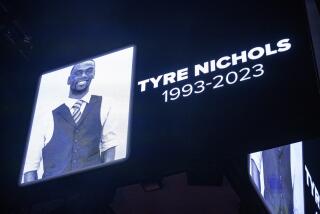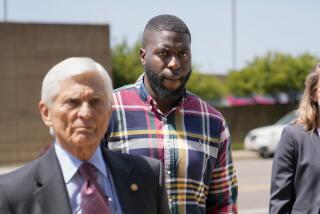Guilty verdict in courthouse murder trial
- Share via
An Atlanta man who claimed the delusion that he was leading a “slave rebellion” had launched him on a courthouse shooting spree was found guilty of murder Friday.
Jurors, who rejected Brian Nichols’ insanity claim, on Monday will begin hearing evidence in the sentencing phase of the trial. They must decide whether Nichols, 36, should receive the death penalty or life in prison for the 2005 rampage that left four people dead -- including a judge, a court reporter and two law enforcement officers. Another police officer suffered serious brain damage.
Nichols, who had been on trial on charges that he raped his former girlfriend when he broke out of a courthouse holding cell and launched his attacks, sat impassively, his head bowed slightly, as the verdict was read. The judge’s widow and Nichols’ father quietly wiped away tears.
Dressed in a gray pinstripe suit, Nichols did not appear to make eye contact with the jurors, who found him guilty on 54 counts -- including felony murder, aggravated assault, hijacking, escape, armed robbery and kidnapping.
Contrary to Nichols’ claims of mental incapacity, a jailhouse informant testified that his escape was carefully planned. And in a letter to a woman with whom Nichols was corresponding, he appeared to believe jurors who would acquit him could be selected.
“My goal is a not-guilty verdict,” Nichols said in the letter, which the prosecution read in court. “All I need is the right people on the jury and I can go home.”
“It didn’t have anything to do with insanity or delusion,” prosecutor Clint Rucker told jurors in his closing argument. “The defendant was angry, and he was frustrated. He is cold-blooded. He is vicious. He is remorseless. And he is extremely, extremely dangerous.”
But defense attorney Josh Moore said Nichols’ letters from jail after the shootings, in which he compared himself to Nat Turner, Nelson Mandela and Malcolm X, proved he was delusional.
“This is a case about a broken mind,” Moore told the jury.
After the verdict, defense lawyers raised concerns about some of Superior Court Judge James Bodiford’s rulings on testimony during the trial. Bodiford said he believed that his rulings had been fair and that expert witnesses had been given the full opportunity to present their findings.
“You thought I treated one side different than the other . . . so if you want to blame me, OK,” he said.
On March 11, 2005, Nichols was preparing to be escorted to Judge Rowland Barnes’ courtroom when he overpowered a guard, nearly beating her to death. He seized her gun and went into the courtroom, killing Barnes and his court reporter. Nichols then gunned down a sheriff’s deputy who attempted to stop him outside the Fulton County Courthouse, hijacked a car and fled downtown Atlanta.
While on the run, Nichols killed an off-duty federal agent. He was captured about 26 hours later after a young woman whose apartment he forced himself into at gunpoint was able to escape and call 911.
Ashley Smith Robinson, a former drug addict, testified during Nichols’ trial that she gave him drugs, which seemed to calm him, and read to him from “The Purpose-Driven Life,” a Christian self-help book by mega-church pastor Rick Warren.
A defense psychiatrist testified that Nichols saw Barnes as a slave master, in part because the judge had on his office wall a portrait of Confederate Gen. Robert E. Lee and a comical picture of a cat facing a jury of dogs. Barnes and his court reporter were white; both sheriff’s deputies attacked during the rampage were African American, as is Nichols.
According to his confession, Nichols told police that rather then spend his life in prison for rape, “I felt that possibly I could use my talents to do something noble, and I thought a slave rebellion was noble.”
--
More to Read
Sign up for Essential California
The most important California stories and recommendations in your inbox every morning.
You may occasionally receive promotional content from the Los Angeles Times.










